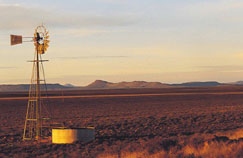Team to look at potential impact of Karoo shale gas
13 May 2015
The South African government has commissioned an investigation into the possible
effects and potential mitigation opportunities of shale gas if it is found in the
country.
"If indeed viable deposits are found in South Africa, shale gas, as a relatively lower
carbon energy source, presents significant transformative potential for the South
African economy," Science and Technology Minister Naledi Pandor said in Pretoria
on 12 May.
The government had commissioned the Strategic Environmental Assessment of
Shale Gas Development to look into the resource, she explained. "Not only could
the exploitation of deposits of lower carbon shale gas – if found – result in the
provision of affordable and safe energy, [but] it is also a potential source of job
creation, foreign exchange and investment."
It would also contribute towards South Africa's energy security, Pandor said. She
was speaking at a media briefing as the
representative of a ministerial task team
comprising the departments of Environmental Affairs, Mineral Resources, Energy,
and Water and Sanitation.
The Strategic Environmental Assessment (SEA) was launched at the briefing. Pandor
explained that the assessment would be a scientific undertaking done to improve
the understanding of the risks of and opportunities for shale gas development. "We
believe that this will assist [the] government to create a framework and guiding
principles to inform responsible decision-making.
Exploration and production
"The Strategic Environmental Assessment will consider both exploration- and
production-related activities and impacts of shale gas development, including the
process of hydraulic fracturing, and will include an assessment of all material
social, economic and biophysical risks and opportunities presented," she said.
The study area will include regions of the Karoo Basin which currently have
exploration rights; applications are pending in Northern Cape, Eastern Cape and
Western Cape. It will run over 24 months.
A project team comprising the Council for Scientific and Industrial Research (CSIR),
the South African National Biodiversity Institute and the Council for Geoscience will
undertake the SEA. It will be led by systems ecologist Professor Bob Scholes of the
University of the Witwatersrand; he is also a research associate of the CSIR.
"The three affected provinces, namely Western Cape, Eastern Cape and Northern
Cape, are part of the national project executive committee. The governance
structure includes a process custodian group compromising 15 representatives from
[the] government, research institutions, industry experts and non-government
organisations," Pandor said.
The people of South Africa would most benefit if it was found that viable deposits of
lower carbon shale gas existed, enabling exploitation, extraction and
development.
"We do, however, recognise we are not at a stage where we can say with certainty
that there are significant deposits."
Impact on the environment
The interdepartmental task team must consider:
- Environmental impact on ecosystems, waste management, etc;
- Challenges of impact on water, given that South Africa is a water-scarce
country;
- Possible impact on the already progressing Square Kilometre Array; and,
- Establishment of a regulatory regime that would guide all processes.
The assessment must be "salient" and cover all the important issues and concerns
around shale gas. It must include groups of leading experts to ensure "credibility",
and be grounded in transparent and participatory processes to ensure "legitimacy",
Pandor said.
"To further ensure that the SEA process is 'salient', 'legitimate' and 'credible', the
project team will be supported by a multi-author
team comprising of scientists and
experts from a broad range of sectors from across different provinces of South
Africa… [to ensure] that a broad balance of interest is represented. Each strategic
issue identified will be addressed by the teams of authors, who are recognised
experts and knowledgeable persons. The work of the multi-author teams will in turn
be reviewed by independent experts."
Informed by existing literature and public concerns, the following strategic issues
have been identifies as part of the scope of the assessment:
- Biodiversity and ecosystem services;
- Water resources (surface and ground water);
- Geophysics;
- Economics (including agriculture and tourism);
- Spatial planning;
- National energy planning;
- Waste management;
- Human health;
- Air quality;
- Social fabric;
- Visual;
- Heritage resources; and,
- Sense of
place.
SAinfo reporter
 The semi-desert Karoo region of South Africa (Photo: Roger de la Harpe, South African Tourism)
The semi-desert Karoo region of South Africa (Photo: Roger de la Harpe, South African Tourism)





